Children’s Corner: Description of the Program
- Children’s Corner:
- the center for early childhood learning and development in Suffolk, Virginia;
- founded in 2010 by the group of educators and social services specialists;
- invites infants, toddlers, and preschoolers;
- classes are divided according to the age and development;
- the age-appropriate curriculum is offered.
Children’s Corner is the center for early childhood learning and development that is located in Suffolk, Virginia. Children’s Corner was founded in 2010 by the group of educators and social services specialists. The center addresses the needs and interests of infants, toddlers, and preschoolers. The classes are divided according to the age and the level of development. The working hours are 7 AM-6 PM, and the center is opened from Sunday till Saturday. The center proposes the age-appropriate curriculum and flexible schedules for all ages. The daily activities include the reading, playing, singing, physical exercises, the exploration of the world around, and the group work.
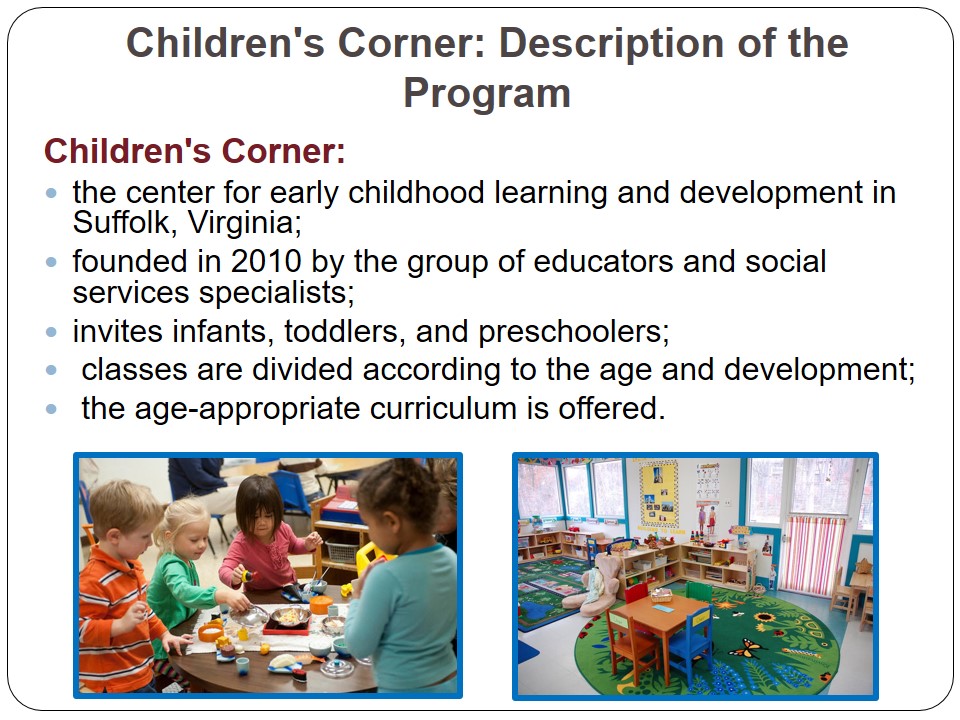
Philosophy for Family and Community Engagement
- Priorities:
- cooperative relationships with families and communities;
- mutual understanding between the staff and families;
- the strong collaboration to guarantee the positive, secure, and supportive environment for children.
The Children’s Corner staff values the cooperative relationships with families and communities based on the mutual understanding as the priority and basis for providing services and addressing the children’s learning and developmental needs. The focus on the strong collaboration with families and communities is important in order to provide children with the positive, secure, and supportive environment.
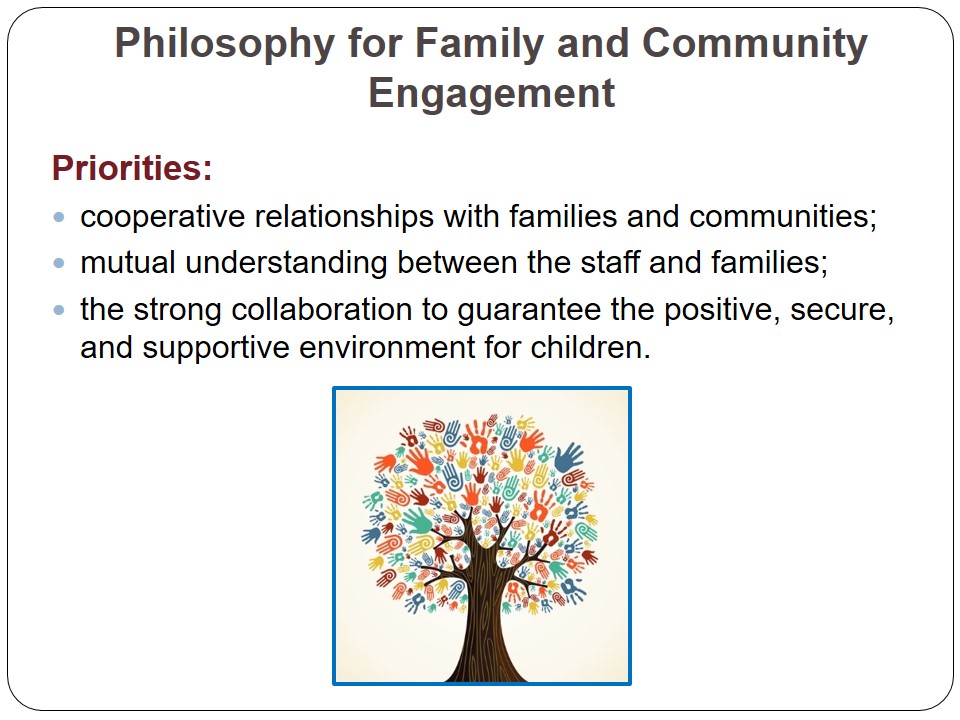
Support for the Program’s Philosophy
- Young children perceive environments acutely.
- Much attention should be paid to the support and interventions (Sommer, Chase-Lansdale, Brooks-Gunn, Gardner, Rauner, & Freel, 2012).
- Collaboration of educators and parents creates the atmosphere of love and care (Aslanian, 2015).
- Constant contacts with educators address parents’ needs (Blitz, Kida, Gresham, & Bronstein, 2013).
The philosophy followed in Children’s Corner is based on the best practices and theories in the field of family and community engagement. According to Sommer, Chase-Lansdale, Brooks-Gunn, Gardner, Rauner, and Freel (2012), young children perceive their environments and attitudes to them acutely, and much attention should be paid to the support and interventions observed during this developmental stage. Aslanian (2015) agrees that the collaboration of educators and parents is important to create the atmosphere of love and care in the environments where children spend a lot of time. Moreover, the constant contact with educators provides parents with the necessary support to improve their care and address their needs (Blitz, Kida, Gresham, & Bronstein, 2013).
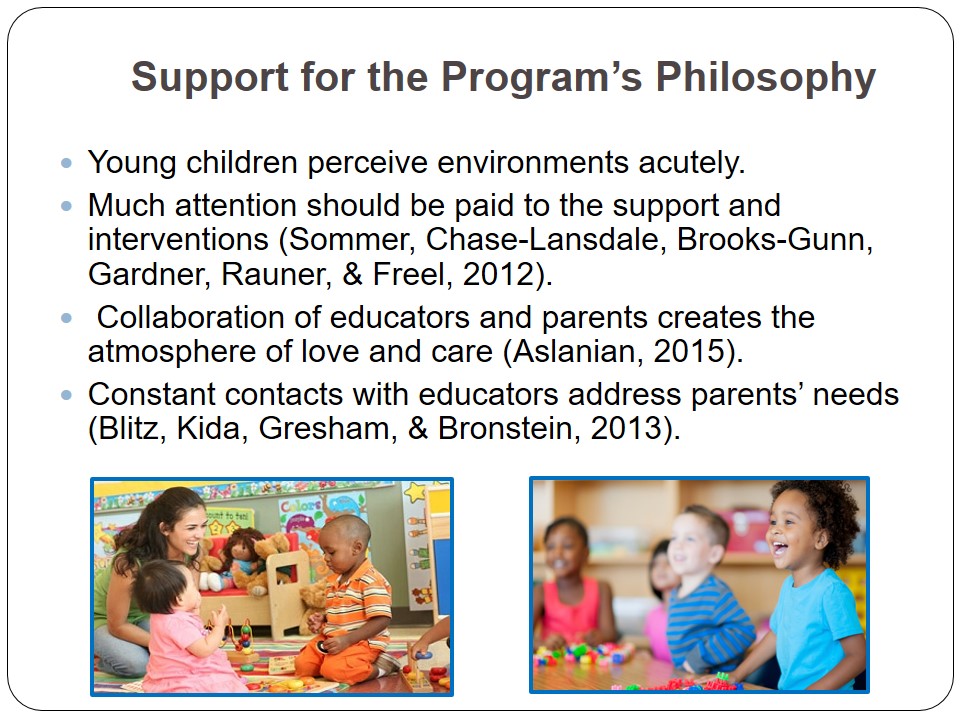
Learning and Development Plan
The Learning Goal:
to address the needs of young children in terms of supporting and facilitating their physical, cognitive, emotional, and social development.
- Lesson plans developed by specialists.
- Developmentally appropriate activities in reading, pre-writing, mathematics, science, music, playing, and creative art.
- Activities developing communication and social skills.
- Strategies and tools: play, positive reinforcement, support, praise, discussions, group and team work, technologies, projectors, and differentiated strategies.
The goal of Children’s Corner is to address the needs of young children in terms of supporting and facilitating their physical, cognitive, emotional, and social development. The center proposes activities oriented to children’s learning, growth, and care. The learning and development plan includes the following components:
- Lesson plans developed by specialists in the early childhood education.
- Developmentally appropriate activities in reading, pre-writing, mathematics, science, music, playing, and creative art.
- Activities developing communication and social skills.
- The used strategies and tools are the play, positive reinforcement, support, praise, discussions, group and team work, the use of technologies and projectors, and differentiated strategies.
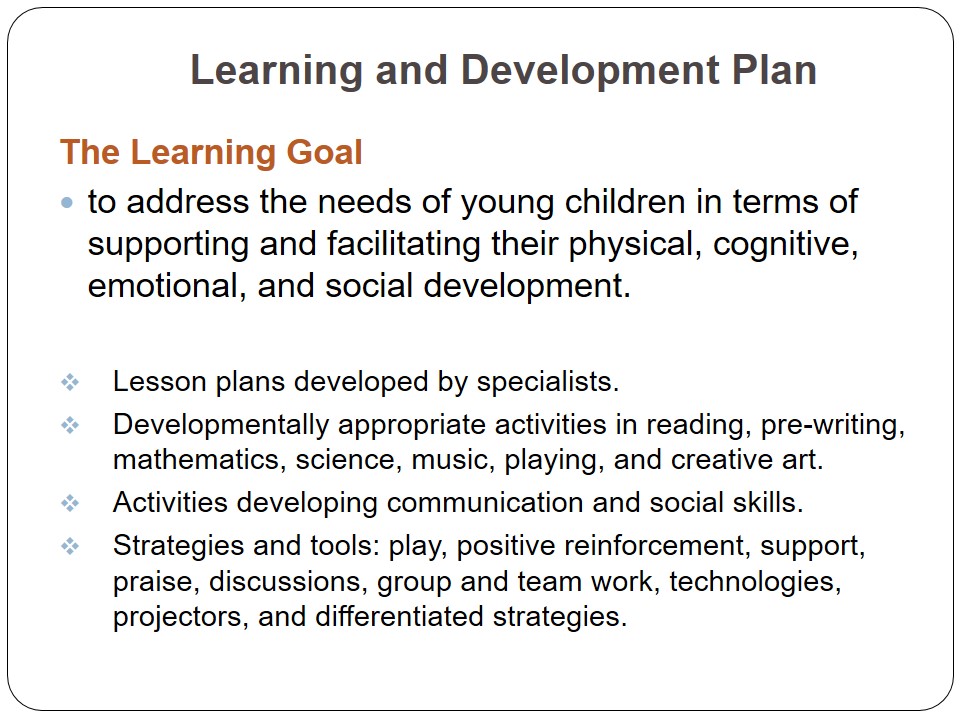
Family and Community Engagement Plan
Goal of Family and Community Engagement Plan:
to promote the cooperation of educators, families, and communities in order to create the secure and supportive environment appropriate for the children’s development (Aslanian, 2015; Barbour, Barbour, & Scully, 2011).
- Regular meetings with parents.
- Regular contacting on students’ progress.
- Monthly family and community events.
- Consultation for parents.
- Participation of parents in decision making.
- Involvement of families in the Center Council and planning schedules.
- Regular assessment of the level of families’ involvement (Fantuzzo, Gadsden, Li, Sproul, & McDermott, 2013).
The goal of the Family and Community Engagement Plan is to promote the cooperation of educators, families, and communities in order to create the secure and supportive environment appropriate for the children’s development (Aslanian, 2015; Barbour, Barbour, & Scully, 2011).
The key activities represented in the plan are the following ones:
- Regular meetings with parents.
- Regular contacting on students’ progress.
- Monthly family and community events.
- Consultation for parents.
- Participation of parents in decision making.
- Involvement of families in the Center Council and planning schedules.
- Regular assessment of the level of families’ involvement (Fantuzzo, Gadsden, Li, Sproul, & McDermott, 2013).
- It is also necessary to refer to the major plan components in detail.
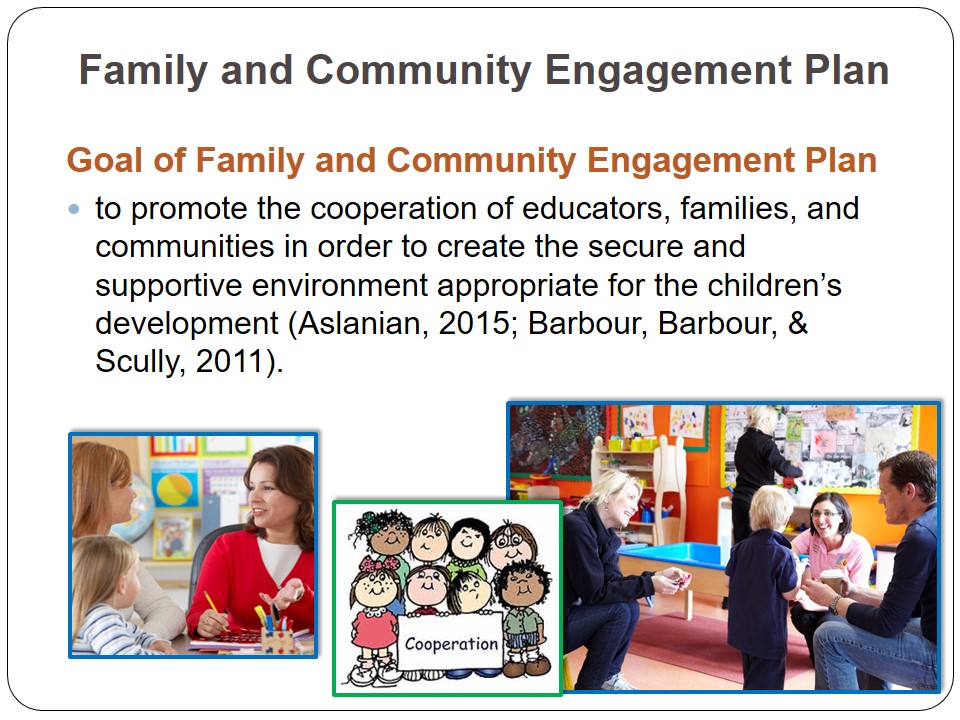
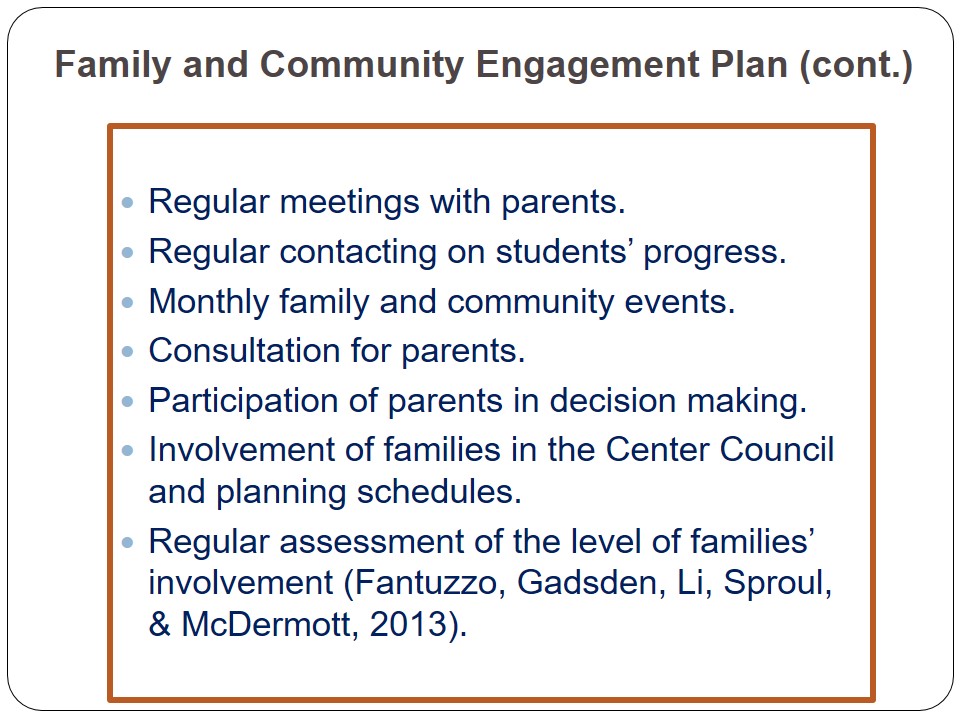
Developmental and Learning Outcomes for the Child
- Improved socialization of a child (contacts with the center staff, counselors, social service specialists, and community representatives);
- Development of communication skills;
- Development of thinking (learning activities, home tasks);
- Improved skills in the group and team work (cooperation);
- Development of creative thinking and skills (Barbour et al., 2011; Sommer et al., 2012).
Children’s Corner proposes the efficient family and community engagement plan, the learning and development outcomes of which are numerous. It is important to mention the improved socialization of a child through contacting the center staff, counselors, and social service specialists, as well as the community representatives; the developed communication skills; the development of thinking referring to learning activities and home tasks involving the work with parents; the improved skills in the group and team work based on the constant cooperation with other children; the development of creative thinking and skills based on the out-of-class activities involving families and community representatives (Barbour et al., 2011; Sommer et al., 2012). As a result, children learn how to cooperate with peers and adults, as well as how to act independently.
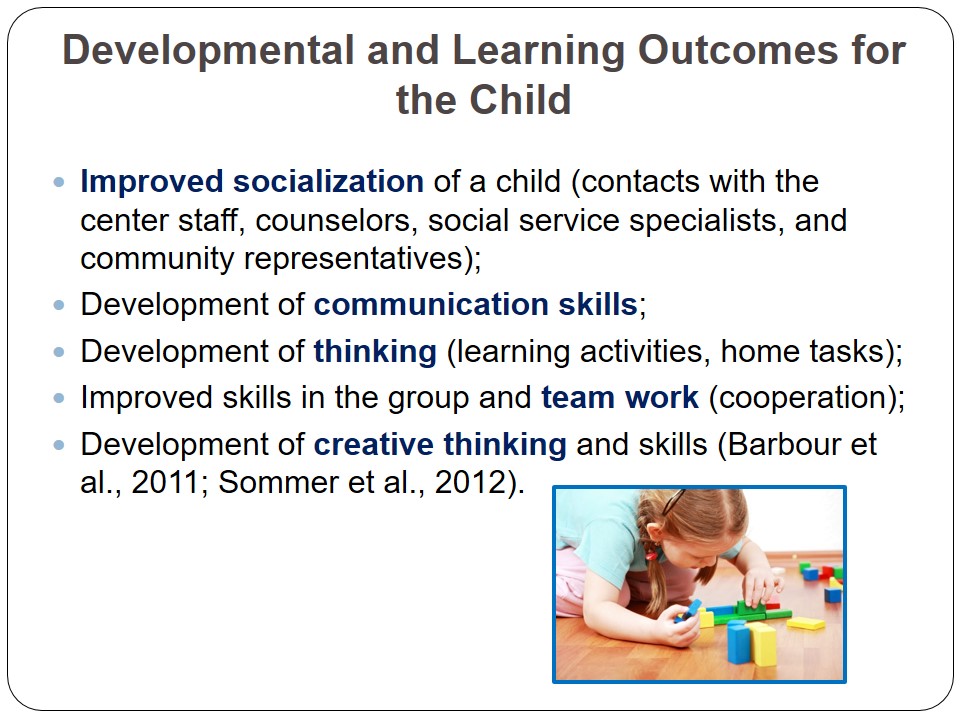
Respectful Engagement with Diverse Family Groups
Children’s Corner invites children from families with different ethnic and cultural backgrounds, economically disadvantaged, and belonging to vulnerable categories.
- Priorities:
- Cultural sensitivity;
- Respect for diversity;
- Respect for different needs;
- Provision of the support, assistance, protection, training, and care for families (Sommer et al. 2012).
Children’s Corner does not impose any limits for inviting children from families that are regarded as coming from different ethnic backgrounds, economically disadvantaged, or belonging to vulnerable categories of the population. The cultural sensitivity and the respect for diversity are the priorities for specialists working in the center. Therefore, the program is based on the idea of providing the support and assistance for all children and families who need the assistance, protection, training, and care (Sommer et al. 2012). The center works to address the needs of students from different racial backgrounds, belonging to different cultures, having different social statuses, and having various needs and interests.
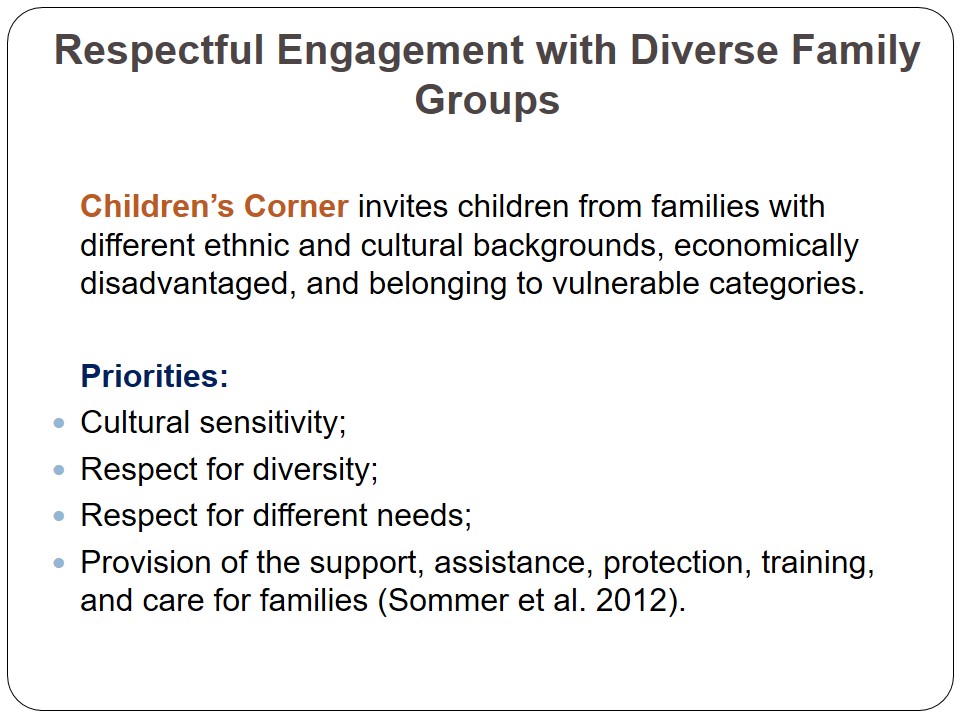
Approach to Including Families Whose Children Have Special Needs
- Families having children with special needs are welcomed in Children’s Corner!
- Children with special needs are included in groups according to the age;
- Their needs are addressed individually;
- Each child receives the required care, attention, and assistance;
- Parents are regularly contacted on the children’s progress;
- Schedules are confirmed with parents.
Those families who have children with special needs are welcomed in this center as the specialists working in Children’s Corner organize effective groups in which all children are included, but their needs are addressed individually in order to ensure that each child receives the required care, attention, and assistance. Parents of children with special needs are regularly contacted on the progress of their children, and schedules for working with groups including children with disabilities are confirmed with parents in order to guarantee that all details are taken into account.
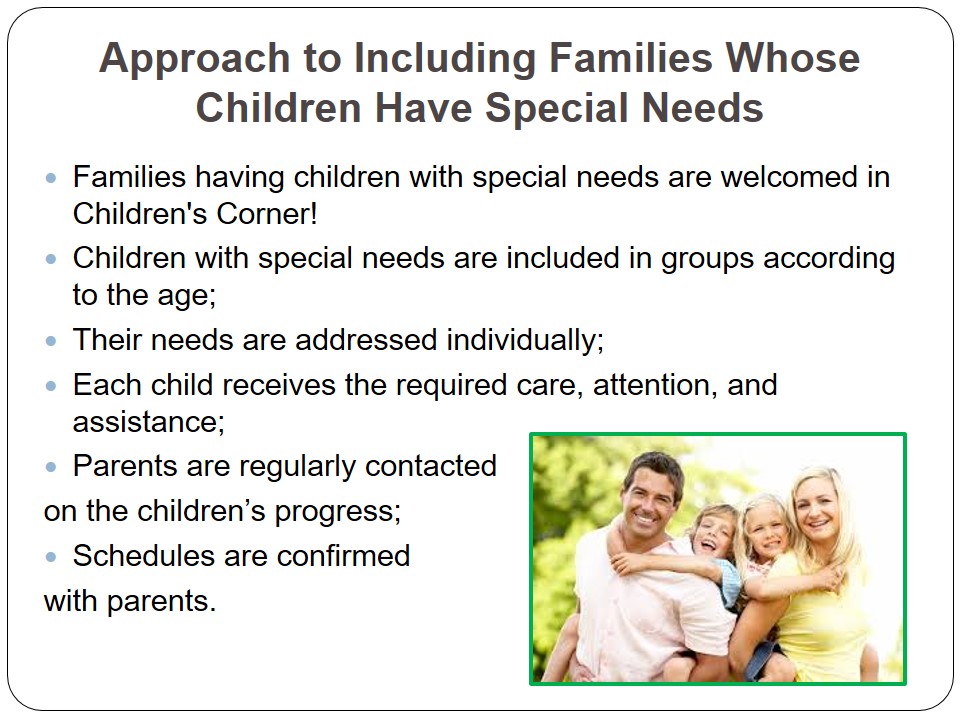
Facilitation and Support for Connecting with Community Organizations
- Partnerships with:
- charity organizations;
- social centers for women and youth;
- centers of children’s health and physical development.
- Children’s Corner organizes:
- festivals;
- family events;
- picnics;
- camps.
- Community organizations are sponsors;
- Parents receive:
- the updated information from brochures;
- consultation and assistance of partners regarding child protection, counseling, nutrition, and health care.
Children’s Corner develops partnerships with charity organizations located in the community, with the social centers for women and youth, with centers of the children’s health and physical development. During spring, summer, and autumn, specialists working in Children’s Corner organize festivals, family events, picnics, and camps based on the support of community organizations and parents. Community organizations also function as sponsors to provide the center with the support and required materials to meet the children’s needs. The goal is to strengthen the connections between the family, community, and educators for the benefits of a child. Parents can receive all the updated information about the planned activities organized in the center or community from the Children’s Corner brochures. Parents can also receive the consultation and assistance of our partners regarding the child protection, counseling, nutrition, and health care.
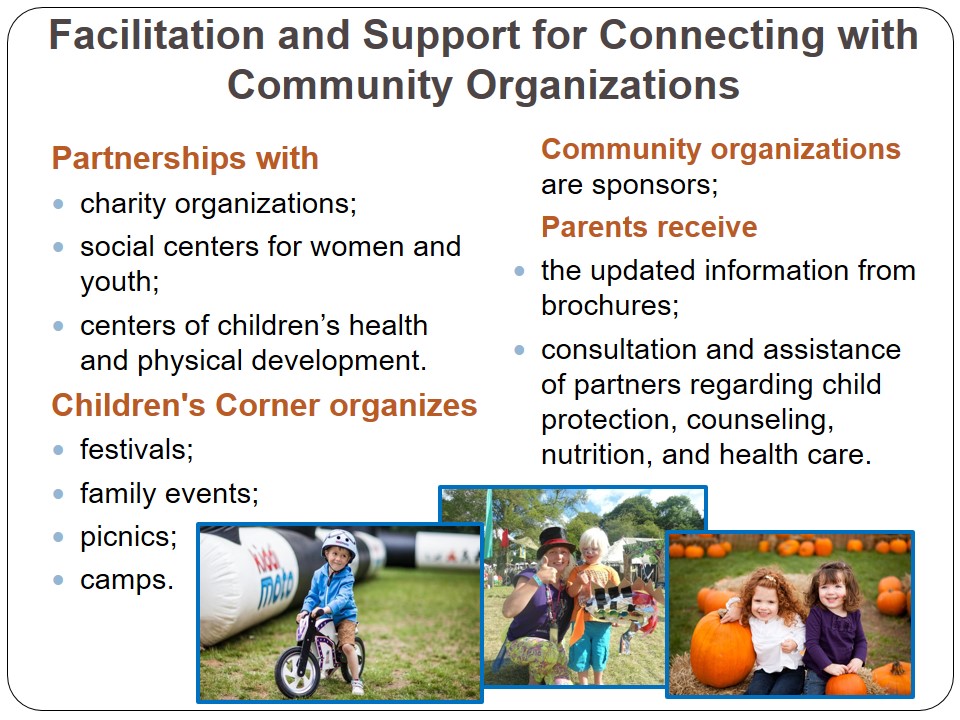
Evidence of Quality Early Care and Education Programs
The Children’s Corner staff:
- professional educators and specialists in the early childhood psychology and development;
- receive regular training;
- focus on the high-quality care, education, and development;
- use innovative educational technologies.
- Schedules are confirmed with specialists;
- Classroom environments are arranged to address the needs of children with disabilities;
- Equipment is of the high quality and age-appropriate;
- Learning and development are based on high standards and evidence-based approaches (Anderson, 2014).
The staff working in Children’s Corner consists of professional educators and specialists in the field of the early childhood psychology and development. They receive the regular training in order to improve their skills in working with children. The high-quality care, education, and development are also achieved with the focus on using the innovative educational technologies, tools, strategies, and materials. Much attention is paid to using the certified and approved materials and instruments. The schedules are confirmed with specialists in the field of the early childhood education. The classroom environments are arranged to address the needs of children with disabilities, and these children work with qualified specialists. The equipment used in the classrooms is of the high quality and age-appropriate. The learning and development are based on high standards and evidence-based approaches (Anderson, 2014).
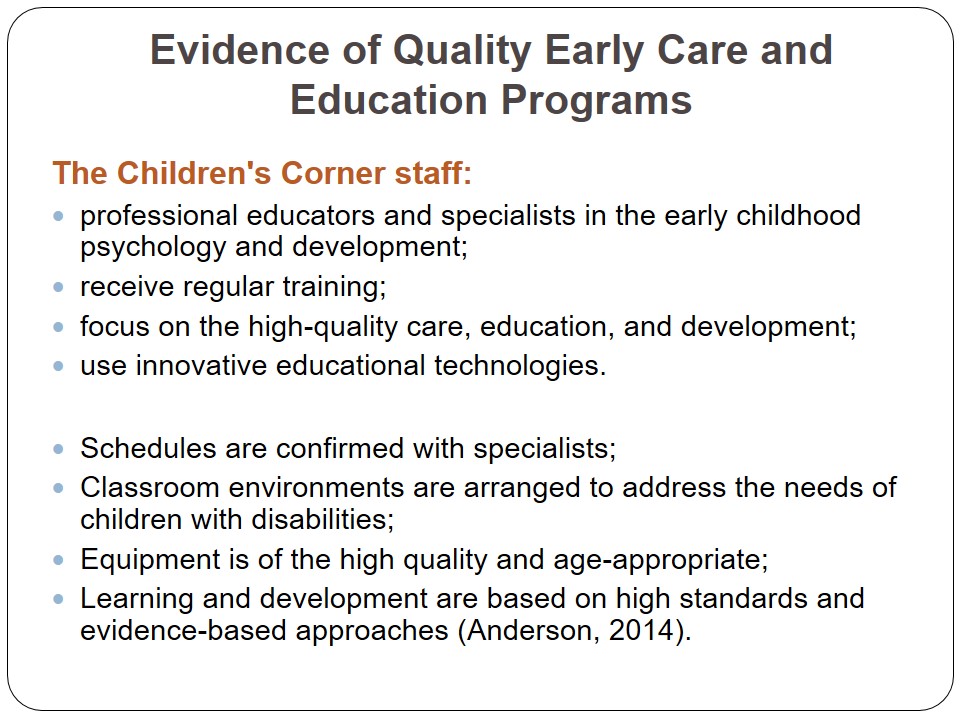
Concluding Remarks
Children’s Corner:
- proposes the effective Family and Community Engagement Plan;
- all children receive the necessary support and care;
- they have an opportunity to develop in the positive environment;
- they are involved in age-appropriate and interesting activities;
- the stimulation of physical, cognitive, emotional, and social development is guaranteed.
Children’s Corner is the center for early childhood learning and development that proposes the effective Family and Community Engagement Plan in order to ensure that all children receive the necessary support and care, and they have an opportunity to develop in the positive environment while being involved in the age-appropriate and interesting activities stimulating their physical, cognitive, emotional, and social development.
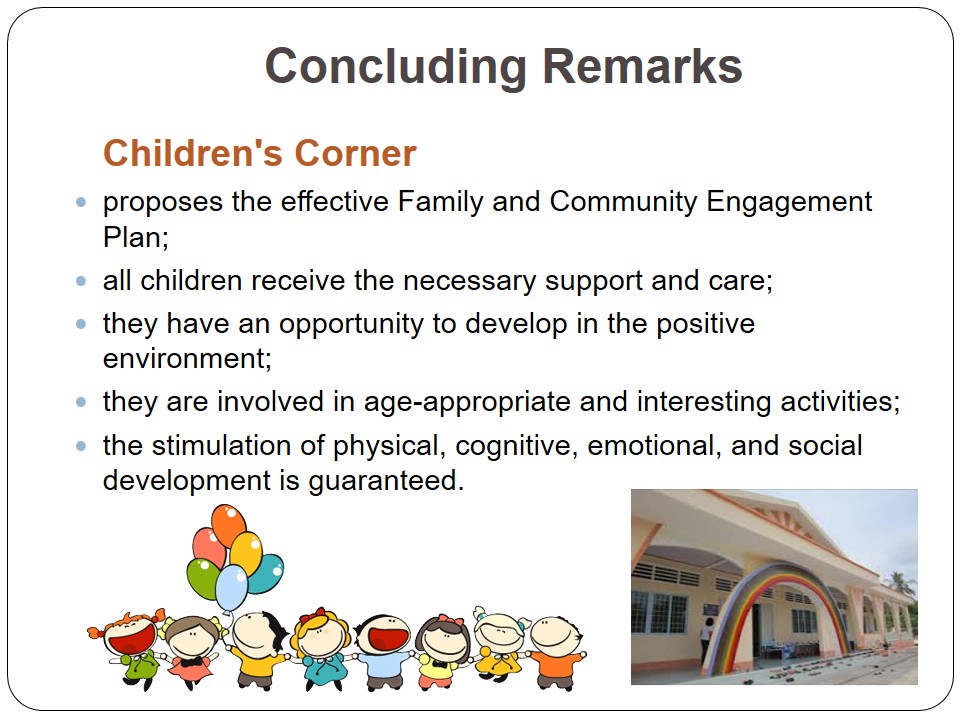
References
Anderson, E. M. (2014). Transforming early childhood education through critical reflection. Contemporary Issues in Early Childhood, 15(1), 81-82.
Aslanian, T. K. (2015). Getting behind discourses of love, care and maternalism in early childhood education. Contemporary Issues in Early Childhood, 16(2), 153-165.
Barbour, C., Barbour, N., & Scully, P. (2011). Families, schools, and communities. Upper Saddle River, NJ: Pearson.
Blitz, L., Kida, L., Gresham, M., & Bronstein, L. (2013). Prevention through collaboration: Family engagement with rural schools and families living in poverty. Families in Society: The Journal of Contemporary Social Services, 94(3), 157-165.
Fantuzzo, J., Gadsden, V., Li, F., Sproul, F., & McDermott, P. (2013). Multiple dimensions of family engagement in early childhood education: Evidence for a short form of the Family Involvement Questionnaire. Early Childhood Research Quarterly, 28(4), 734-742.
Sommer, T. E., Chase-Lansdale, P. L., Brooks-Gunn, J., Gardner, M., Rauner, D. M., & Freel, K. (2012). Early childhood education centers and mothers’ postsecondary attainment: A new conceptual framework for a dual-generation education intervention. Teachers College Record, 114(2012), 1-40.